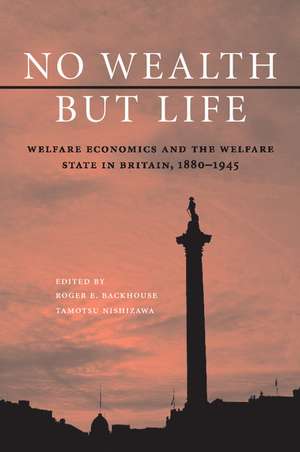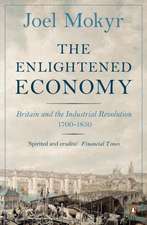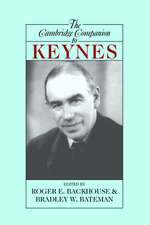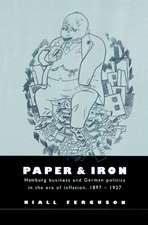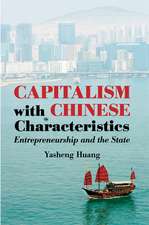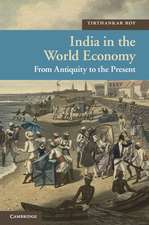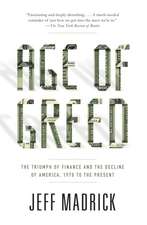No Wealth but Life: Welfare Economics and the Welfare State in Britain, 1880–1945
Editat de Roger E. Backhouse, Tamotsu Nishizawaen Limba Engleză Paperback – 7 oct 2015
| Toate formatele și edițiile | Preț | Express |
|---|---|---|
| Paperback (1) | 284.78 lei 43-57 zile | |
| Cambridge University Press – 7 oct 2015 | 284.78 lei 43-57 zile | |
| Hardback (1) | 524.98 lei 43-57 zile | |
| Cambridge University Press – 21 mar 2010 | 524.98 lei 43-57 zile |
Preț: 284.78 lei
Nou
Puncte Express: 427
Preț estimativ în valută:
54.50€ • 56.55$ • 45.55£
54.50€ • 56.55$ • 45.55£
Carte tipărită la comandă
Livrare economică 17-31 martie
Preluare comenzi: 021 569.72.76
Specificații
ISBN-13: 9781107569430
ISBN-10: 1107569435
Pagini: 258
Dimensiuni: 152 x 230 x 15 mm
Greutate: 0.38 kg
Editura: Cambridge University Press
Colecția Cambridge University Press
Locul publicării:New York, United States
ISBN-10: 1107569435
Pagini: 258
Dimensiuni: 152 x 230 x 15 mm
Greutate: 0.38 kg
Editura: Cambridge University Press
Colecția Cambridge University Press
Locul publicării:New York, United States
Cuprins
1. Introduction: towards a reinterpretation of the history of welfare economics Roger E. Backhouse and Tamotsu Nishizawa; Part I. Cambridge Welfare Economics and the Welfare State: 2. Marshall on welfare economics and the welfare state Peter Groenewegen; 3. Pigou's 'prima facie case': market failure in theory and practice Steven G. Medema; 4. Welfare, taxation and social justice: reflections on Cambridge economists from Marshall to Keynes Martin Daunton; Part II. Oxford Ethics and the Problem of Welfare: 5. The Oxford approach to the philosophical foundations of the welfare state Yuichi Shionoya; 6. J. A. Hobson as a welfare economist Roger E. Backhouse; 7. The ethico-historical approach abroad: the case of Fukuda Tamotsu Nishizawa; Part III. Welfare Economics in the Policy Arena: 8. 'The great educator of unlikely people': H. G. Wells and the origins of the welfare state Richard Toye; 9. Whose welfare state? Beveridge versus Keynes Maria Cristina Marcuzzo; 10. Beveridge on a welfare society: an integration of his trilogy Atsushi Komine; Part IV. Postscript: 11. Welfare economics, old and new Roger E. Backhouse and Tamotsu Nishizawa.
Recenzii
'This remarkable collection of essays makes all previous histories of welfare economics obsolete. With the publication of this volume, we are able to see for the first time that to understand the strengths and weaknesses of traditional welfare economics requires a knowledge of the full historical context out of which it arose. Backhouse and Nishizawa have edited a landmark study.' Brad Bateman, Denison University, Ohio
'This book offers a new perspective on the development of welfare economics in the first half of the twentieth century. Backhouse and Nishizawa's team, comprising leading specialists from six countries, has produced a marvellous combination of perceptive analysis and wide thinking. No Wealth but Life is a milestone in the intellectual history of the economic strategies of the New Liberalism.' Eugenio F. Biagini, Sidney Sussex College, University of Cambridge
'Everybody is familiar with the old-new welfare economics divide and Arrow's impossibility theorem as the landmark issues through which the discipline took its present shape. Backhouse and Nishizawa convincingly argue that, from the point of view of the intellectual origins of the modern welfare state, there is another and equally important issue that has not received equal attention: the divide between the economists who saw welfare economics as a branch of utility analysis and those who built on the foundations of the Oxford idealism of T. H. Green and of Ruskin's moral critique of capitalism with a view to immediate political action. The essays collected in the volume highlight moments and characters of this intellectual divide, which was originally a Cambridge-Oxford affair but subsequently led to wider echoes in Britain and in other countries. They make fascinating reading, especially in this age of rethinking the purposes and viability of political welfare systems and attempts at reconstructing welfare economics on non-utilitarian premises.' Marco Dardi, University of Florence, Italy
'No Wealth but Life is an instructive contribution to the history of British welfare economics, questioning and refining the standard views on the subject. The book considerably enriches the common narrative - all too often confined to the Cambridge School - both by drawing attention to a relatively neglected but influential Oxford (and LSE) approach to welfare and by exploring the influence of welfare economics on public policy in Great Britain. The carefully selected papers - nicely put into context by the editors' highly informative introduction and postscript - illuminate various aspects of this intricate story. I have little doubt that the volume will become a must-read for all scholars of the history of welfare economics.' Guido Erreygers, University of Antwerp, Belgium
'No Wealth but Life rescues welfare economics from the sterility of pure theory and returns the story to the men and women who imagined that economics might help mitigate urban poverty. Political reform and the rise of the welfare state are integral to the analysis. The Fabians, John and Barbara Hammond, Leonard Hobhouse, and Graham Wallas play roles every bit as important as those of Sidgwick, Marshall, and Pigou. This is a rich history designed to remind us that economics was shaped by people who hoped to make the world a better place.' Evelyn L. Forget, University of Manitoba, Canada, and co-editor, Journal of the History of Economic Thought
'The papers in No Wealth but Life provide a wide-ranging historical and philosophical discussion of welfare economics during the period when the British welfare state was being established. The book is a very important contribution to the literature on this underexamined topic in the history of economics and public policy.' D. Wade Hands, University of Puget Sound
'This book offers a new perspective on the development of welfare economics in the first half of the twentieth century. Backhouse and Nishizawa's team, comprising leading specialists from six countries, has produced a marvellous combination of perceptive analysis and wide thinking. No Wealth but Life is a milestone in the intellectual history of the economic strategies of the New Liberalism.' Eugenio F. Biagini, Sidney Sussex College, University of Cambridge
'Everybody is familiar with the old-new welfare economics divide and Arrow's impossibility theorem as the landmark issues through which the discipline took its present shape. Backhouse and Nishizawa convincingly argue that, from the point of view of the intellectual origins of the modern welfare state, there is another and equally important issue that has not received equal attention: the divide between the economists who saw welfare economics as a branch of utility analysis and those who built on the foundations of the Oxford idealism of T. H. Green and of Ruskin's moral critique of capitalism with a view to immediate political action. The essays collected in the volume highlight moments and characters of this intellectual divide, which was originally a Cambridge-Oxford affair but subsequently led to wider echoes in Britain and in other countries. They make fascinating reading, especially in this age of rethinking the purposes and viability of political welfare systems and attempts at reconstructing welfare economics on non-utilitarian premises.' Marco Dardi, University of Florence, Italy
'No Wealth but Life is an instructive contribution to the history of British welfare economics, questioning and refining the standard views on the subject. The book considerably enriches the common narrative - all too often confined to the Cambridge School - both by drawing attention to a relatively neglected but influential Oxford (and LSE) approach to welfare and by exploring the influence of welfare economics on public policy in Great Britain. The carefully selected papers - nicely put into context by the editors' highly informative introduction and postscript - illuminate various aspects of this intricate story. I have little doubt that the volume will become a must-read for all scholars of the history of welfare economics.' Guido Erreygers, University of Antwerp, Belgium
'No Wealth but Life rescues welfare economics from the sterility of pure theory and returns the story to the men and women who imagined that economics might help mitigate urban poverty. Political reform and the rise of the welfare state are integral to the analysis. The Fabians, John and Barbara Hammond, Leonard Hobhouse, and Graham Wallas play roles every bit as important as those of Sidgwick, Marshall, and Pigou. This is a rich history designed to remind us that economics was shaped by people who hoped to make the world a better place.' Evelyn L. Forget, University of Manitoba, Canada, and co-editor, Journal of the History of Economic Thought
'The papers in No Wealth but Life provide a wide-ranging historical and philosophical discussion of welfare economics during the period when the British welfare state was being established. The book is a very important contribution to the literature on this underexamined topic in the history of economics and public policy.' D. Wade Hands, University of Puget Sound
Descriere
This book re-examines early twentieth-century British welfare economics in the context of the emergence of the welfare state.
